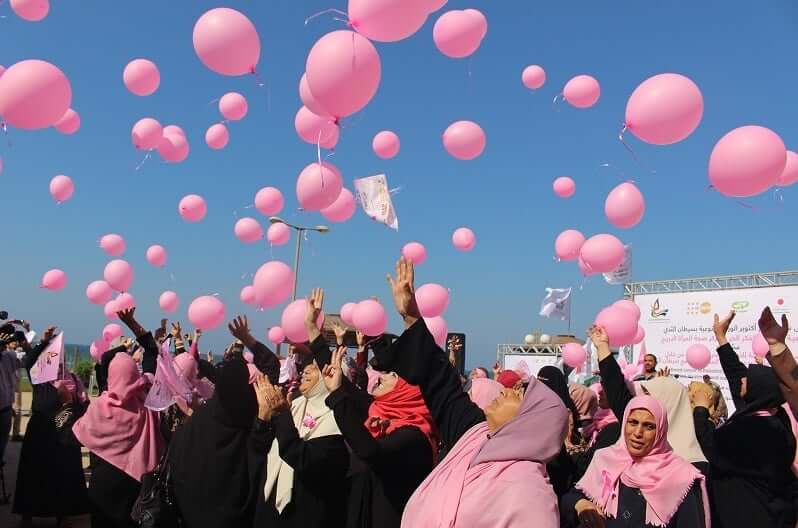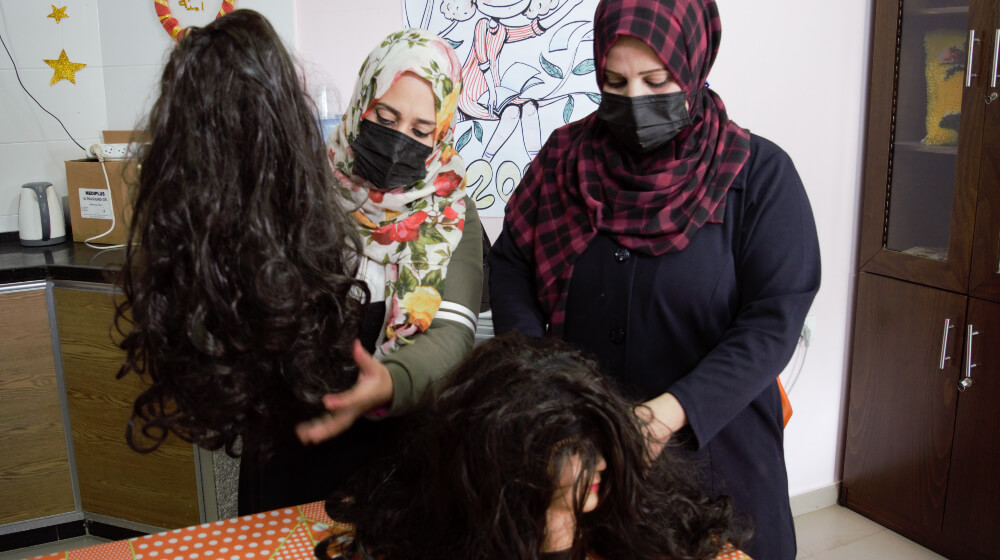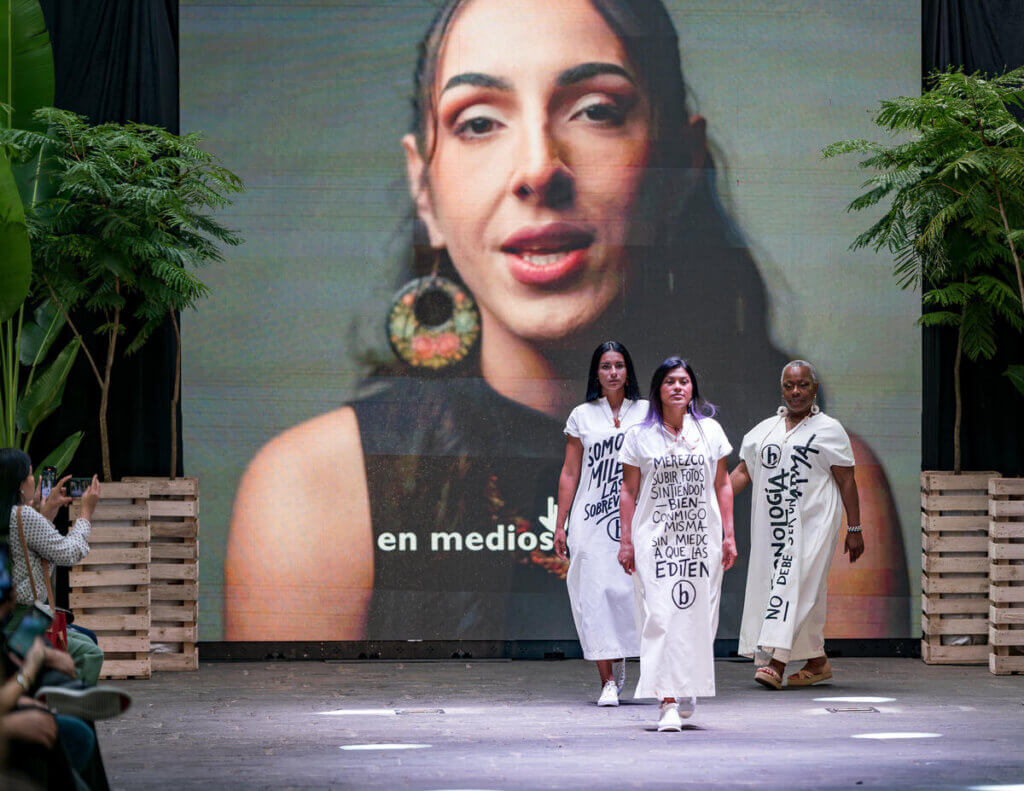Three sexual and reproductive health services you probably didn’t know we provide

As the United Nations Sexual and Reproductive Health and Rights Agency, we strive to provide a full range of sexual and reproductive health services. While you most likely know about our work to end maternal deaths and distribute family planning resources, our services extend much further than that.
So today, we’re going to highlight a few sexual and reproductive health services and protections that you may not know we provide around the world.

Support for Breast Cancer Patients in Gaza
Breast cancer is the number one cancer affecting women globally. In fact, every 14 seconds, someone in the world is diagnosed with breast cancer. This cancer impacts women and girls in every region of the world – including in humanitarian crises such as Gaza, where access to quality healthcare is often limited or inaccessible.
If caught earlier and treated properly, breast cancer has a low mortality rate. In the United States, annual breast cancer mortality is around 2-4%. But unfortunately, this mortality rate spikes in areas with low access to quality sexual and reproductive healthcare and stigmas surrounding treatment. In lower-income nations, 1 in 48 women will die from breast cancer.
But we’re working to change this statistic. We have been in Palestine providing support for breast cancer patients for the last 20 years – and this support extends past the physical process of screening and treatment. In Gaza and other places with negative perceptions of breast cancer and its association with death, women often avoid getting screened for the cancer. Women will avoid discussing their suspicions of cancer with others and refuse treatment, because a diagnoses and treatment can affect family status, cause abandonment by husbands, or harm marriage prospects for their children.
It is not enough to simply offer screening and treatment – we must also change the community’s attitude toward breast cancer as well. One of the ways that we are accomplishing this is through wig making classes at our women’s health centers.
“I was bullied by my own community. They called me ‘the bald one,” Bahia, a breast cancer survivor told us. “What was even worse was that my one-year-old daughter was afraid of me.”
Bahia felt rejected by society, until she turned to one of our wig-making courses. This course not only provided her with the means to cover her head while her hair grew back in, but it also provided her with a tight-knight community of other survivors and people who have loved ones who are cancer patients.
“My mother is very sick,” Wesam, one of the participants of the wig-making course shared with us. “She lost her hair and cannot tolerate the way people look at her. What better way to support my mother?”

Mental Health Counseling as Prenatal Care
“I felt lost, because I couldn’t get pregnant,” Alaa shared from Syria. After suffering through two miscarriages in three years, she was wracked with grief. Less than one year after her second miscarriage, Alaa discovered once again that she was pregnant, and her grief mixed with a fresh wave of fear at experiencing yet another painful loss.
Alaa, who herself is a general practitioner at the UNFPA-supported Medina Maternity and Neonatal Hospital, turned to the team for support. She had received treatment for three years by Dr. Bakkour, who reassured her after a series of tests that she did not have any significant health issues that would cause another miscarriage.
However, through the evaluation, Dr. Bakkour did discover that Alaa was experiencing severe anxiety and fear that could cause pregnancy complications. She referred Alaa to a psychiatrist, who could help her learn healthy coping mechanisms. “90% of her treatment was down to mental health support,” Dr. Bakkour told us.
Finally, the day came when Alaa delivered a healthy baby. “Without the support I received from the team, I could not have had a baby,” Alaa shared with us, holding her new daughter.
Mental health is a critical part of maternal healthcare. About 1 in 5 women experience a mental health condition during or after pregnancy, and left untreated, these conditions can have catastrophic impacts on mother and baby alike.

Fighting online forms of violence
Violence against women can take many forms – especially in the ever-evolving landscape of technology. According to a 2020 study, 83% of women globally have experienced or witnessed digital violence against other women, 57% of women have had their videos or images online abused or misused, and 96% of online deepfake videos are pornography. 100% of those deepfake videos are of women.
When Olimpia was 18, she consented to recording a sexual video with a boyfriend that she trusted. However, it wasn’t long until she realized that he was unfaithful to her, and soon they broke up. Then, he leaked the video, which only featured Olimpia. The video made its way around Olimpia’s small town rapidly, starting first on WhatsApp, then Facebook, then pornography websites.
Olimpia’s entire life began to fall apart. She received dozens of Facebook friend requests from men each day who said they had the video downloaded and would only delete it if she had sex with them.
“I stopped going to school, avoiding many things because I was embarrassed,” Olimpia told us. “Your naked body became public without your permission, but people blame you because you let yourself be recorded. In such a macho country, you are evil, a whore, a provocateur, and you come to believe them.”
Olimpia tried to die by suicide three times. Then came the day that the video was sent to her mother.
“My mom took the phone and cried while watching the video. I was very afraid, my body burning. You feel guilty that you are harming your family,” Olimpia continued.
But Olimpia’s mother was not crying from shame – she was crying at what her daughter enduring. She comforted her daughter, telling her “It is not your fault” and “Dear, we all have sex. The difference is that here people see you, but that doesn’t make you a criminal and that doesn’t make you a bad person.”
Olimpia’s mother and grandmother helped her find a support group and file a complaint with a district attorney. Today, she is determined to fight for herself and other victims of non-consensual sharing of intimate imagery.
We’re fighting alongside Olimpia to put an end to all forms of violence against women, including digital violence. Through things such our “bodyright” campaign and our crisis hotlines, we are working with survivors of violence such as Olimpia to ensure that another woman or girl does not fall victim to the same violence.
Thank you for taking the time to learn more about some of our other work and thank you for helping us uphold every aspect of sexual and reproductive health for those we serve. You help us be there for women and girls, no matter what.